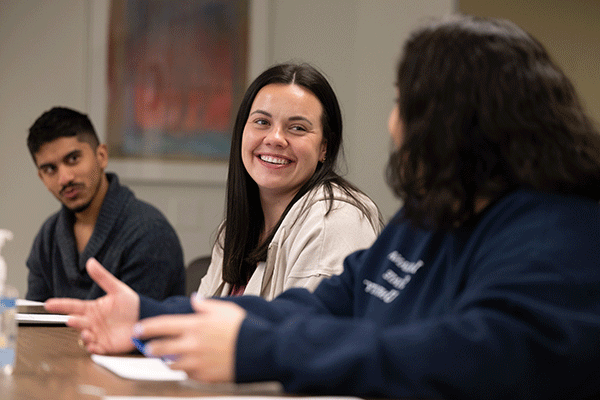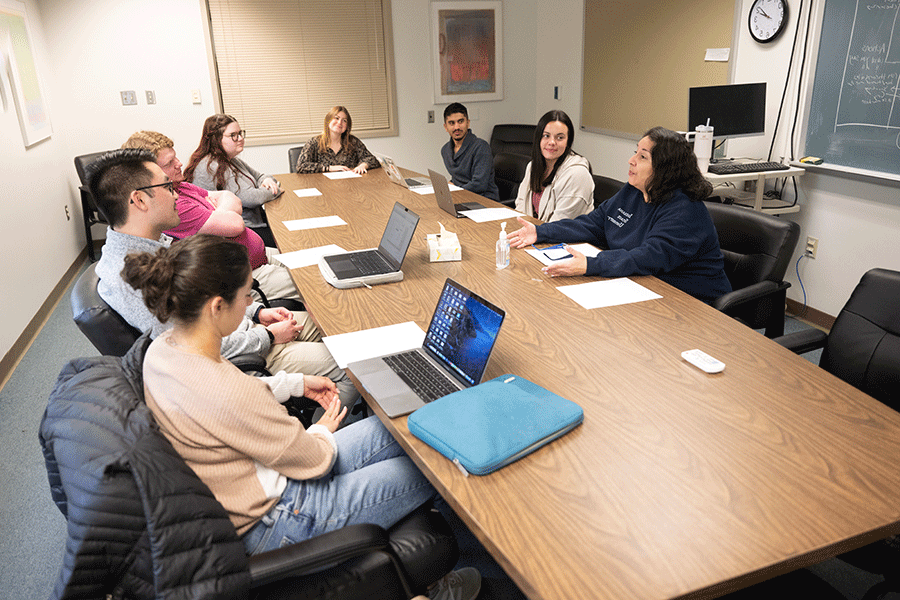Program Availability
The Master of Arts and Master of Science in General Psychology are traditional, on-campus programs offered on the Indiana State University campus in Terre Haute, Indiana. The programs are open to U.S. and international applicants who satisfy admission requirements.
Why Earn a Master’s in Psychology at Indiana State?
Indiana State’s master’s program in psychology combines a strong foundation in general psychology with extensive research experience in general/experimental psychology.
Gain Valuable Research Experience
Indiana State’s master’s program in general psychology is designed primarily for students who intend to enter a doctoral program in one of psychology’s many experimental fields but are not yet prepared for that step.
Consistent with this aim, our program emphasizes basic and experimental psychology and research experience in areas such as cognition, development, social psychology, and biopsychology. The program allows flexible tailoring of individual courses of study to meet the needs and career aspirations of students
The program’s main objectives are:
- To provide students with a strong foundation in the core areas of general psychology that will prepare them for entry into specialized doctoral programs; and
- To provide students with research experience in general/experimental psychology that will support their entry into careers utilizing research and statistical methods.
The program typically requires two years of study. A supervised research project or thesis is required.
Students are encouraged to complete the Master of Arts to enhance their career options or to prepare for doctoral programs.
Note: Our program does not provide training for people interested in counseling or clinical psychology.
About Our Faculty
As a graduate student in the Department of Psychology, you will benefit from small classes taught by dedicated faculty mentors with diverse expertise. All hold advanced degrees, and many run labs engaged in scientific discovery and scholarly publication. Coursework is enriched with lectures and symposia presented by local professionals and nationally known scholars. Learn more about our faculty.
Learning Beyond the Classroom
As a graduate student in the Psychology Department, you will gain firsthand experience in the Department’s research laboratories. Each lab focuses on a specific concentration, including cognition, developmental, social and environmental psychology, and other areas.
Explore Our Faculty Research Laboratories
- Our ADHD Lab is engaged in a number of projects related to evaluation for ADHD among children as well as parent help-seeking behavior and adherence to assessment recommendations.
- Our Adversity, Dissociation, and Psychological Trauma (ADAPT) Lab is focused on posttraumatic stress disorder, dissociation, and other trauma-related mental health conditions.
- Our Correctional & Forensic Psychology Lab is primarily focused on research projects that involve correctional and forensic populations as well as mental health providers who work with these populations.
- Our Lifespan Cognition & Brain Stimulation (LCABS) Lab is engaged in several projects related to evaluating cognition in young and older adults, using non-invasive brain stimulation. We specifically focus on how the cerebellum contributes to non-motor cognitive behavior across the lifespan.
- Our Mental Health Development Lab is primarily focused on psychological measurement. Current studies include personality in college students; personality and neurocognitive indicators of liability to mental illness, particularly endophenotypic markers of liability to schizophrenia and schizotypy.
- Our Social & Environmental Psychology Lab conducts research projects in four areas, including close relationships, environmental symbolism & meaning, socio-spatial behavior, and evolutionary bases of behavior
What You’ll Learn in the Psychology Program
As a graduate student in psychology, your coursework will include study in core areas of general psychology combined with research in areas such as cognition, development, social psychology, and biopsychology.
You will have the option of taking additional courses in such areas as liking and loving, evolutionary psychology, psychology of women and gender, cultural psychology, and ontogeny.
A culminating research experience is required. Students are encouraged to complete the Master of Arts degree to enhance their career options or to prepare for doctoral programs
Assistantships and Scholarships
Most students accepted into the Psychology Master’s Program receive some form of financial assistance, which is renewable each year. However, students must have at least a 3.0 undergraduate GPA (on a 4.0 scale) to be awarded a graduate assistantship. Graduate assistantships require 15-20 hours per week of work. Scholarship awards that waive tuition and fees, exclusive of building and student service fees, are also available.
Career Possibilities for Psychology Graduates
Our graduates pursue a variety of career paths. Some complete doctoral programs in social psychology, quantitative psychology, educational psychology, and cognitive neurosciences.
Others obtain professional positions in which they use the research skills they’ve acquired in our program. A few of these positions include marketing researcher, statistical and research consultant, research associate, and director of student assessment at a college.
Students are encouraged to complete the Master of Arts degree to enhance their career options.
Admission Requirements and Instructions
Enrollment is accepted only for the Fall semester. To be assured of consideration for fall admission, all materials must be submitted by February 15. Financial aid applications must also be made by February 15.
Note: It must not be assumed that meeting minimal standards guarantees admission to the program.
Admission Requirements and Information
Applicants must possess a bachelor’s degree in a relevant field from a regionally accredited institution (for international students, a degree granted by a recognized institution). In this bachelor’s degree, applicants must have taken at least 12 credits in psychology. These courses should include general introductory psychology, psychological statistics, research methods, and learning or cognition (or their equivalent).
Applicants must have a minimum cumulative grade point average of 2.75 grade point average in all undergraduate coursework.
Application should include a current curriculum vitae and a personal statement. Click here for the personal statement form that should be submitted as part of your application.
Application should include three letters of recommendation from individuals familiar with your academic and/or professional and interpersonal competence and can speak competently to your ability to succeed in a master’s program in general psychology. Important: Have the names and email addresses of your references available at the time that you are completing your admission application as you will need to enter them in the online application. Explain to your references that they will receive an email from Indiana State University requesting that they submit a letter of recommendation. Please ensure that your references expect to receive this request. It will be sent to your references immediately upon completing the application.
How to Apply
Complete your online application for program admission at apply.yilunjianshe.com/portal/apply?tab=overview.
Submit official transcripts from all colleges previously attended. To be official, transcripts must be sent directly from the college attended to: Graduate Admissions, Indiana State University, Welcome Center, 318 North Sixth Street, Terre Haute, IN, 47809. E-transcripts should be sent to admissions@yilunjianshe.com.
Submit a nonrefundable application fee of $45.00 (U.S. citizens and permanent residents) or $65.00 (international students) payable by Visa, MasterCard, or check or money order payable to Indiana State University. Submit payment to: Indiana State University, Graduate Admissions, Welcome Center, 318 North Sixth Street, Terre Haute, IN, 47809
Submit the following as part of the online application process.
- Download and complete all fields in the Psychology Department Application.
- Application should include three letters of recommendation from individuals familiar with your academic and/or professional and interpersonal competence and can speak competently to your ability to succeed in a master’s program in general psychology. Important: Have the names and email addresses of your references available at the time that you are completing your admission application as you will need to enter them in the online application. Explain to your references that they will receive an email from Indiana State University requesting that they submit a letter of recommendation. Please ensure that your references expect to receive this request. It will be sent to your references immediately upon completing the application.
- Application should include a personal statement. Click here for the personal statement form that should be submitted as part of your application.
- A current curriculum vitae
International applicants must submit official scores for the Test of English as a Foreign Language (TOEFL) or provide equivalent evidence of language proficiency. Submit scores to: Indiana State University, Graduate Admissions, Welcome Center, 318 North Sixth Street, Terre Haute, IN, 47809. For important information, see Instructions for International Students.
To be assured of consideration for admission, all application materials must be submitted by February 15 for fall admission. Enrollment is accepted only for the Fall semester. Financial aid applications must also be made by February 15.
Next Steps
Once admitted, students receive notification from the University as well as their University ID number needed to activate their University Username on the MyISU Portal. The Portal offers access to online registration, University records, and other important University services, including email and University announcements.
Note: Returning ISU students must apply for re-admission if they have not attended Indiana State University for more than two calendar years.
-

Clinical Psychology (PsyD)
Doctoral
-

Psychology (BS)
Bachelor's
-

School Psychology (EdS)
Graduate Certificate / Licensure Ed Specialist





